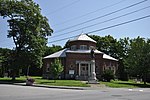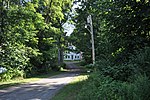The Battle of Norridgewock was a raid on the Abenaki settlement of Norridgewock by a group of colonial militiamen from the New England Colonies. Occurring in contested lands on the edge of the American frontier, the raid resulted in a massacre of the Abenaki inhabitants of Norridgewock by the militiamen.
The raid was undertaken to check Abenaki power in the region, limit Catholic proselytizing among the Abenaki (and thereby perceived French influence), and to allow the expansion of New England settlements into Abenaki territory and Acadia. New France defined this area as starting at the Kennebec River in southern Maine.: 27 Other motivations for the raid included the special £100 scalp bounty placed on Râle's head by the Massachusetts provincial assembly and the bounty on Abenaki scalps offered by the colony during the conflict.
Captains Johnson Harmon, Jeremiah Moulton, and Richard Bourne (Brown) led a force of two hundred colonial New Englanders, which attacked the Abenaki village of Narantsouak, or Norridgewock, on the Kennebec River; the current town of Norridgewock, Maine developed near there. The village was led by, among others, the sachems Bomazeen and Welákwansit, known to the English as Mog. The village's Catholic mission was run by a French Jesuit priest, Father Sébastien Râle.Casualties, depending on the sources consulted, vary, but most accounts record about eighty Abenaki being killed. But both English and French accounts agree that the raid was a surprise nighttime attack on a civilian target, and they both also report that many of the dead were unarmed when they were killed, and those massacred included many women and children. As a result of the raid, New Englanders flooded into the lower Kennebec region, establishing settlements there in the wake of the war.








